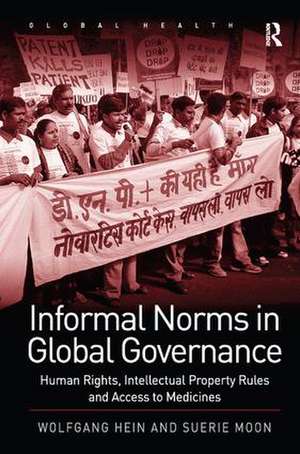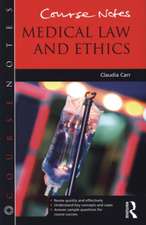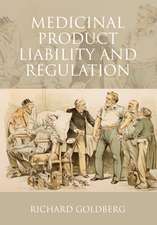Informal Norms in Global Governance: Human Rights, Intellectual Property Rules and Access to Medicines: Routledge Global Health Series
Autor Wolfgang Hein, Suerie Moonen Limba Engleză Hardback – 15 feb 2013
| Toate formatele și edițiile | Preț | Express |
|---|---|---|
| Paperback (1) | 469.34 lei 6-8 săpt. | |
| Taylor & Francis – 15 noi 2016 | 469.34 lei 6-8 săpt. | |
| Hardback (1) | 1057.89 lei 6-8 săpt. | |
| Taylor & Francis – 15 feb 2013 | 1057.89 lei 6-8 săpt. |
Din seria Routledge Global Health Series
- 9%
 Preț: 935.92 lei
Preț: 935.92 lei - 5%
 Preț: 271.78 lei
Preț: 271.78 lei - 18%
 Preț: 997.11 lei
Preț: 997.11 lei - 25%
 Preț: 768.46 lei
Preț: 768.46 lei - 18%
 Preț: 1000.27 lei
Preț: 1000.27 lei - 25%
 Preț: 500.13 lei
Preț: 500.13 lei -
 Preț: 469.34 lei
Preț: 469.34 lei - 18%
 Preț: 1112.34 lei
Preț: 1112.34 lei -
 Preț: 451.32 lei
Preț: 451.32 lei -
 Preț: 469.34 lei
Preț: 469.34 lei -
 Preț: 469.34 lei
Preț: 469.34 lei - 26%
 Preț: 765.77 lei
Preț: 765.77 lei - 18%
 Preț: 1004.20 lei
Preț: 1004.20 lei -
 Preț: 381.98 lei
Preț: 381.98 lei - 12%
 Preț: 299.52 lei
Preț: 299.52 lei - 5%
 Preț: 310.16 lei
Preț: 310.16 lei -
 Preț: 386.57 lei
Preț: 386.57 lei - 5%
 Preț: 1099.22 lei
Preț: 1099.22 lei - 13%
 Preț: 330.94 lei
Preț: 330.94 lei
Preț: 1057.89 lei
Preț vechi: 1290.10 lei
-18% Nou
Puncte Express: 1587
Preț estimativ în valută:
202.46€ • 209.76$ • 168.96£
202.46€ • 209.76$ • 168.96£
Carte tipărită la comandă
Livrare economică 21 martie-04 aprilie
Preluare comenzi: 021 569.72.76
Specificații
ISBN-13: 9781409426332
ISBN-10: 1409426335
Pagini: 260
Ilustrații: Includes 9 b&w illustrations
Dimensiuni: 156 x 234 x 16 mm
Greutate: 0.54 kg
Ediția:New ed
Editura: Taylor & Francis
Colecția Routledge
Seria Routledge Global Health Series
Locul publicării:Oxford, United Kingdom
ISBN-10: 1409426335
Pagini: 260
Ilustrații: Includes 9 b&w illustrations
Dimensiuni: 156 x 234 x 16 mm
Greutate: 0.54 kg
Ediția:New ed
Editura: Taylor & Francis
Colecția Routledge
Seria Routledge Global Health Series
Locul publicării:Oxford, United Kingdom
Notă biografică
Wolfgang Hein, GIGA German Institute of Global and Area Studies, Germany and Suerie Moon, Harvard University, USA.
Recenzii
A Yankee Book Peddler UK Core Title for 2013 ’A fascinating study of how to achieve global change in an area of critical importance to millions of people, against considerable odds, through the combination of innovative ideas, clever strategies and the power of norms. If it can be done through access to medicines, it can also be done elsewhere.’ John Gerard Ruggie, Harvard University, USA ’Global health is increasingly challenged to deal with the transnational political and the commercial determinants of health - but international political institutions are often weak and fragmented and find it difficult to apply the legal and normative instruments at their disposal. This book describes the fundamental conflicts of interest at stake and illustrates how the framing of access to medicines as a human right has opened up new opportunities for civil society to demand a new approach to global governance for health. Its message is clear: global health requires a change in the character of global politics.’ Ilona Kickbusch, The Graduate Institute Geneva, Switzerland
Cuprins
Chapter 1 Introduction; Chapter 2 Towards a Global Society; Chapter 3 Access to Medicines: A Matter of Human Rights; Chapter 4 Access to Medicines and Intellectual Property; Chapter 5 The HIV/AIDS Crisis: The Rise of the Access Norm; Chapter 6 Beyond HIV in Africa: Solidification and Expansion of the Access Norm; Chapter 7 Challenges to the Stability of Informal Norms; Chapter 8 Re-framing the Access Norm: Incorporating Innovation; Chapter 9 The Impact of Non-state Actors on Informal Norms: Nodal Governance and Global Democracy; Chapter 10 Conclusions;
Descriere
Hein and Moon take up a serious problem of contemporary global governance: what can be done when international trade rules prevent the realization of basic human rights? This book recounts the remarkable story of the access to medicines movement and offers an explanation for how the 'access norm' emerged against long odds. It also explores the stability and scope of the norm with respect to other diseases and emerging economies. Finally, in light of the high barriers to changing formal global trade rules, the book considers the potential and limitations of informal norms for protecting human rights, and when renewed focus on changing formal norms may be warranted.












